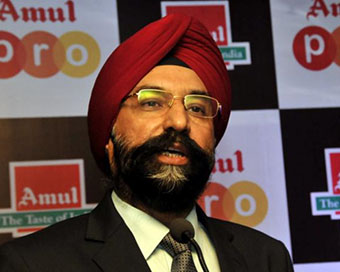Gallery
 PM Modi visit USA
PM Modi visit USA Only the mirror in my washroom and phone gallery see the crazy me : Sara Khan
Only the mirror in my washroom and phone gallery see the crazy me : Sara Khan Karnataka rain fury: Photos of flooded streets, uprooted trees
Karnataka rain fury: Photos of flooded streets, uprooted trees Cannes 2022: Deepika Padukone stuns at the French Riviera in Sabyasachi outfit
Cannes 2022: Deepika Padukone stuns at the French Riviera in Sabyasachi outfit Ranbir Kapoor And Alia Bhatt's Wedding Pics - Sealed With A Kiss
Ranbir Kapoor And Alia Bhatt's Wedding Pics - Sealed With A Kiss Oscars 2022: Every Academy Award Winner
Oscars 2022: Every Academy Award Winner Shane Warne (1969-2022): Australian cricket legend's life in pictures
Shane Warne (1969-2022): Australian cricket legend's life in pictures Photos: What Russia's invasion of Ukraine looks like on the ground
Photos: What Russia's invasion of Ukraine looks like on the ground Lata Mangeshkar (1929-2022): A pictorial tribute to the 'Nightingale of India'
Lata Mangeshkar (1929-2022): A pictorial tribute to the 'Nightingale of India' PM Modi unveils 216-feet tall Statue of Equality in Hyderabad (PHOTOS)
PM Modi unveils 216-feet tall Statue of Equality in Hyderabad (PHOTOS)The Badminton Association of India (BAI) has announced a 14-member-strong India squad for
- Men’s Sr Hockey Nationals to be played in division-based format from April 4
- Mensik denies Djokovic 100th title in Miami final
- KIPG: Son of a vegetable vendor, Bihar’s Jhandu Kumar eyes Worlds, 2028 Paralympics
- Hardik Singh credits hard work and team unity for receiving HI Midfielder of the Year award
- Djokovic, Alcaraz land in same half of Miami draw
Amul chief says new farm laws are good, only doubts need to be put to rest Last Updated : 11 Feb 2021 12:43:25 PM IST 
R.S, Sodhi, Managing Director of Amul Communication, flexibility and adequate tweaking of the law to ensure that the big corporates do not reap the benefits and monopolise the situation are the need of the hour to end the impasse over the three farm laws, R.S, Sodhi, Managing Director of Amul said, adding that farm reforms are critical for the economy.
"Government's intention is good. These farm laws are good. But yes, there are some apprehensions and they need to be removed," Sodhi said.Speaking exclusively to IndiaNarrative.com, Sodhi said that while farmers have demanded legal framework to continue the system to providing minimum support price (MSP), it has not brought any benefit to the agriculture sector.MSP has not yielded results"My views on MSP are totally different. Sectors such as milk, poultry, fisheries do not have any MSP system. Yet they are growing. Those engaged in animal husbandry have seen 14 per cent growth in the last 10 years while in agriculture growth has been only 3 per cent," Sodhi said.The Amul boss added that MSP should be provided for agricultural items where production is not adequate. MSP should be determined on the basis of demand and supply, he added."If you keep giving MSP on products where production is surplus, for example, wheat, paddy sugarcane, then on one side you will have surplus production and on the other you will have deficit on other items such as pulses, where you need to give import substitution," Sodhi said, adding that farmers must be given the freedom to sell their produce anywhere they want.He pointed out that competiveness and supply chain have improved in the dairy segment which has players from all walks including cooperative, domestic private sector as well as multinational despite not getting MSP or other subsidies."In the milk industry, there are co-operatives, private players as well as MNCs-- they are all competing. It is not possible for a handful to monopolise the market," he said.Incidentally, India is one of the leading producers of milk in the world, accounting for over 20 per cent of the global supply. India's milk production in 1991-92 was estimated at 55.6 million tonnes. In 2017-18, it was 176.3 million tonnes.Sodhi also said that the co-operative structure, which has carved out the success story in India's dairy segment, should be adopted for agriculture sector as well, which would then push the smaller farmers who often do not benefit from the government schemes.Sodhi added that the aim now should be to resolve the deadlock over the farm sector reforms. He said that both sides which essentially include the government and the farmers need to compromise while being flexible. "The government has already agreed (on most issues) but now farmers also have to understand, they need to have faith in the government," he said.Farmers' organisations along with several other vested groups have come out in protest against three farm reform bills � The Farmers' Produce Trade And Commerce (Promotion And Facilitation) Bill, The Farmers (Empowerment and Protection) Agreement on Price Assurance and Farm Services Bill, and The Essential Commodities (Amendment) Bill. These bills, aimed at creating a free market for sale of farm produce have faced stringent opposition from farmers across.Sodhi said that had the government brought in the laws "gradually" things may have worked out.On food inflationSodhi said that while food inflation in India is considered a bane, higher food prices help in pushing farmers' incomes."My take on food inflation is very different..In India the effort is to always reduce food inflation so that the impact on urban India including those living below poverty line are not impacted but this has other implication. When you keep food items cheap, industry has to give low wages and the farmers suffer�If you reduce food inflation, you are also reducing farmers' income. So essentially, you have to see how to keep the balance and ensure that while the poor do not suffer, others pay higher food prices. After all farmers income ' title=' farmers income '>farmers income has also to increase," he said.IANS For Latest Updates Please-
Join us on
Follow us on








172.31.16.186







